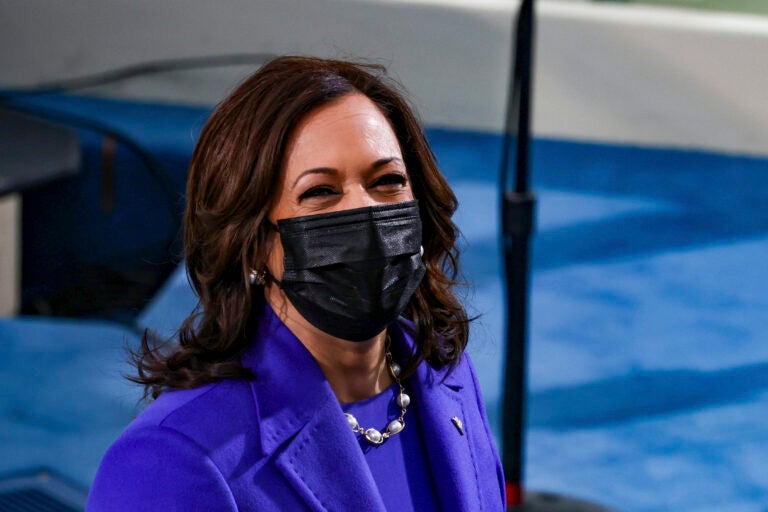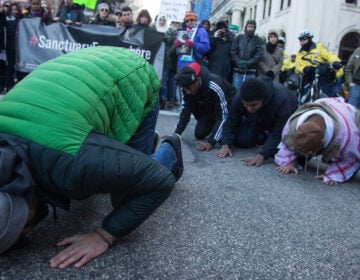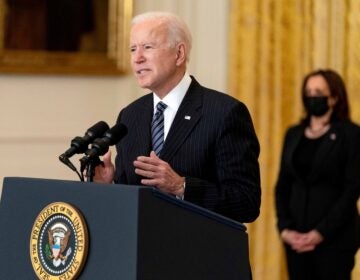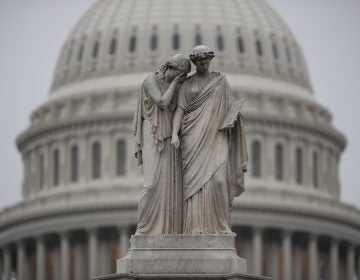‘Motivates the whole community’: South Asian residents from Philly react to VP Kamala Harris
“It is very inspiring for all of us, especially for South Asians who are not necessarily politically engaged,” said one supporter. “Perhaps it will inspire some of our younger

Vice President Kamala Harris looks on during the inauguration of President Joe Biden on the West Front of the U.S. Capitol on Wednesday, Jan. 20, 2021 in Washington. (Tasos Katopodis/Pool Photo via AP)
For some South Asian American residents in the Philadelphia area, Kamala Harris becoming vice president today feels like the American dream in action.
“It’s really exciting for us, being of South Asian origin,” said Jayashree Bhaskar, of Chester County. She and her husband, whose families are from India, founded a southeastern Pennsylvania chapter of the national group They See Blue, which works to mobilize South Asian voters for Democratic candidates.
“Perhaps it will inspire some of our younger people to take more active roles in political circles,” she added.
Harris’s mother, Shyamala Gopalan, grew up in South India. She met Jamaican-born Donald Harris while at the University of California at Berkeley.
Along with being the first woman to be vice president, Harris is both the first South Asian American to get a major party’s nomination for elected nationwide office, and the first Black person to get a major party nomination as vice president.
Jayashree’s husband and fellow They See Blue organizer, K.S. Bhaskar, says he and many other South Asian supporters of President Joe Biden are looking to see the pair live up to their campaign promises.
Chief among those, in his mind: working with other populous, greenhouse-gas-emitting nations to fight climate change, and collaboratively rooting out extremism in the world’s two largest democracies, India and the U.S.
“They should continue to focus on fostering democracy and human rights and activism,” K.S. said. “All of those things, I think, are important for the Biden/Harris administration to foster, not just in India but around the world.”
Murali Balaji, a lecturer at the University of Pennsylvania who co-chaired the group Hindu Americans for Biden, agreed.
He’s an American-born child of a South Asian family, and a practicing Hindu. He said in Harris, with her Indian and Jamaican heritage, he sees “much of what this country has become in terms of cross-cultural and racial ties.”
But he added, “that history-making moment is really overshadowed by the daunting task ahead.”
He also names climate change as a chief concern, along with mounting COVID-19 deaths, “repairing institutions” post-Trump, and “a massive disinformation system that quite literally led to an insurrection.”
“Now the real work has begun,” he said. “In many ways, we are at war with ourselves.”
Immigration debate will be closely watched
In general, Asian American voters tend to vote for Democrats more often than Republicans. A poll of Asian American voters ahead of the election showed that only about 28% of Indian Americans, for instance, said they would vote for Trump.
But Southeast Asian Americans are still a huge, diverse and far from politically monolithic group.
Paresh Birla, who heads the nonpartisan Council of Indian Organizations in Greater Philadelphia, said when he’s coordinating with the many Indian groups in and around the city, he’s often balancing a lot of political priorities.
“Every community,” he said, “has their own personal vision for how things could be.”
People he has heard from tend to want a stronger bond between the U.S. and India, and Birla hopes the fact that Harris’s high-profile role might further that goal. Immigration, he said, is also top of mind.
Biden already announced that he intended to immediately begin working on immigration policy, and has previewed a plan that would create an eight-year path to citizenship for undocumented U.S. residents who were present in the U.S. on Jan 1.
Birla said many South Asian immigrants, particularly those who have been dealing with the U.S. visa process for a long time, are paying close attention to the provisions of that plan to make sure their own bids for citizenship don’t get lost in the shuffle.
He noted that doesn’t mean South Asian immigrants want undocumented people to be pushed aside, just that people who have been trying to follow the U.S.’s complicated rules “should be rewarded, not put in a backlog.”
According to a 2019 Pew report, there are about 10.5 million undocumented immigrants in the U.S. — 1.5 million of which are from Asia, with the large majority from Mexico, Central and South America.
Balaji has also heard concerns about how potential immigration legislation could affect South Asians. He says it would be a mistake for the Biden/Harris administration to create a “one size fits all” immigration system.
“We need to acknowledge that any immigration plan needs to reward those that have followed the rules and come in the ways that the protocols and processes were designed, but also not punish those who have come for various reasons related to hardship and oppression, and who have lived in the shadows,” he said. “Our immigration system, simply put, should not be punitive.”
Birla said despite the many different views he hears from Pennsylvania’s more than 150,000 South Asian immigrants, there’s at least one belief that most have in common: they’re touched to see Kamala Harris on the inauguration stage.
“It’s always good to see an Indian American going up this ladder,” he said. “Making that kind of a stride, it kind of motivates the whole community, to see that they would be able to achieve.”

Get daily updates from WHYY News!
WHYY is your source for fact-based, in-depth journalism and information. As a nonprofit organization, we rely on financial support from readers like you. Please give today.






